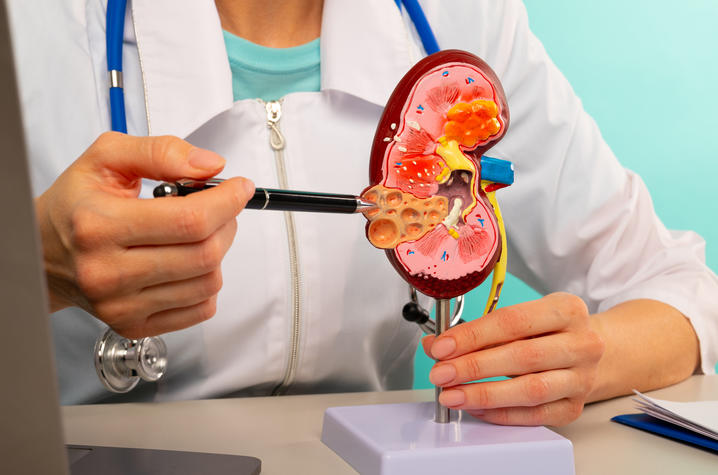Lower your risk for kidney stones

The University of Kentucky Public Relations & Strategic Communications Office provides a weekly health column available for use and reprint by news media. This week’s column is by Peter Sawaya, M.D., chief of UK HealthCare's division of Nephrology, Bone and Mineral Metabolism.
LEXINGTON, Ky. (Dec. 9, 2024) – Kidney stones are common. In the U.S., one in 11 individuals will be affected by them at some point in their life. They’re typically seen in adults between 40 and 60 years old. However, kidney stones can form at any age and time of year. Nearly half of those who develop one kidney stone in their lifetime will develop at least another stone in the future.
What are kidney stones?
Kidney stones are made from large deposits of undissolved minerals and other organic compounds as they get supersaturated and crystalize in the urine. Calcium oxalate stones are the most common, then calcium phosphate and uric acid.
When urine has too many of these crystal-forming substances and not enough liquid, they accumulate to form a hard, stone-like piece of material that can range between the size of a grain of sand to a golf ball. These stones may travel down the urinary tract and get “stuck,” blocking urine flow and potentially causing kidney swelling.
How to lower your kidney stone risk
The most effective and easiest way to prevent kidney stones is simple: Drink plenty of water to produce at least 2.5 liters (80-90 ounces) of urine per day!
Stay well hydrated all year-round, especially during those steamy Kentucky summers and when engaged in sweat-inducing activities like exercise or working in the yard. Lemonade or fluid containing citric acid is a good addition to the water, as citrate inhibits crystal formation. Dark soda and fructose-containing fluid increase your risk of stones and should be avoided.
While most stones have calcium in them, eating food rich in calcium — like leafy green vegetables and dairy products — can actually be beneficial for you. The calcium in these foods binds to oxalate in your intestines and lowers the amount of oxalate that eventually makes its way to the kidneys.
Lowering your intake of sodium, often present in processed meat, high doses of vitamin C and oxalate-rich food, like dark chocolate and spinach, can also lower your kidney stone risk.
What symptoms should I look out for?
Symptoms may not be noticeable until the stone moves inside the kidney or makes its way to the ureter, the tube connecting the kidney and bladder. Common symptoms include:
- Severe pain in the side and back, below the ribs.
- Pain that radiates to the lower abdomen and groin.
- Pain that comes in waves and fluctuates in intensity.
- Pain during urination.
- Pink, red or brown urine.
- Cloudy or foul-smelling urine, if infected.
- Nausea and vomiting.
- Persistent need to urinate.
- Fever and chills if an infection is present.
Inform your doctor if you’ve passed a kidney stone or have any of the above symptoms. Seek immediate medical attention if you experience pain accompanied with nausea or fever, pain so severe you can’t sit in a comfortable position or if you see blood in your urine.
UK HealthCare is the hospitals and clinics of the University of Kentucky. But it is so much more. It is more than 10,000 dedicated health care professionals committed to providing advanced subspecialty care for the most critically injured and ill patients from the Commonwealth and beyond. It also is the home of the state’s only National Cancer Institute (NCI)-designated Comprehensive Cancer Center, a Level IV Neonatal Intensive Care Unit that cares for the tiniest and sickest newborns and the region’s only Level 1 trauma center.
As an academic research institution, we are continuously pursuing the next generation of cures, treatments, protocols and policies. Our discoveries have the potential to change what’s medically possible within our lifetimes. Our educators and thought leaders are transforming the health care landscape as our six health professions colleges teach the next generation of doctors, nurses, pharmacists and other health care professionals, spreading the highest standards of care. UK HealthCare is the power of advanced medicine committed to creating a healthier Kentucky, now and for generations to come.




